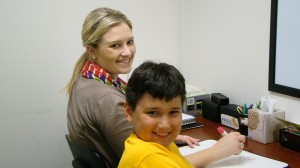
by PRIDE Reading Program Admin | Jan 1, 2012 | Reading Comprehension
Our reading comprehension program helps students who
- Can’t remember or understand what they just read
- Have difficulty keeping track of details and sequence
- Struggle with getting the main idea and making predictions and inferences
At PRIDE Learning Center, reading comprehension is taught one-on-one by our credentialed reading specialists. PRIDE teachers are able to teach students how to both draw meaning from text and to verbally express their understanding of it.
Our highly effective reading comprehension program provides students with the ability to conceptualize mental images that match content, and use language to describe those images. This is what we call visualization. Starting at a concrete level and moving towards more abstract concepts, we are able to help students visualize the content of what they are reading. This method is highly successful in improving reading comprehension as well as memory retention.
At PRIDE Learning Center, we’ll help your child master these important reading comprehension strategies:
- Become an active reader and have goals in mind while working through text
- Make predictions about what is to come
- Look over the structure of the text to determine which sections to read carefully and which to read quickly, which not to read, and so on.
- Construct, Revise and Question the meanings while reading
- Determine meaning of unfamiliar words and concepts in text
- Feel a sense of satisfaction and productivity after reading a text
- VISUALIZATION – making pictures in our minds as we read!
For more information, call (866) 774-3342


by PRIDE Reading Program Admin | Aug 29, 2011 | A PRIDE Post, Language & Reading
By: Renée Firby, MSC CCC-SLP
Over the last several years countless families have come to our offices seeking assistance for their children who are struggling academically. The majority of our school-aged clients present with some form of language learning disabilities. These language learning disabilities can directly impair a child’s reading ability. Research supports that one of the best predictors of a child’s success in reading is an individual’s oral language abilities. So you ask, “What’s the connection?”
As infants we begin to learn language. We respond to pleasant voices by smiling, we turn our heads when we hear sound, and we begin to babble. These emergent language skills continue to grow and develop over the first few years of life to more complex unconscious abilities such as storytelling, developing and understanding humor, making judgments as to the appropriateness of content for certain listeners, editing for errors, learning metaphors, similes, antonyms, synonyms, etc. Although many children acquire the most basic and fundamental components of language such as vocabulary, generating a sentence, and grammar, they fail to learn the more complex language skills. Reading requires the ability to unconsciously define words, recognize synonyms, antonyms, and homonyms, identify parts of speech, recognize grammatical errors, recognize multiple meanings, etc. Therefore, reading is a language-based skill as it utilizes all of the same processes of an individual’s complex oral language skills. If an individual is unable to develop complex oral language skills, they are unable to develop the skills necessary to be a successful reader.
Speech and language intervention is an essential component to the achievement of a successful reader for those who are challenged academically! Intensive treatment supports the development of advanced language skills, which in turn support the skills necessary for reading. Jackson Jade Speech & Occupational Therapy customizes treatment programs that are designed to innervate the areas of the brain responsible for language development, which target the fundamental building blocks for reading including phonemic awareness, phonics, vocabulary development, fluency, and comprehension. Research indicates that stand alone school-based programs are not intensive enough to meet the needs of struggling readers. Children who are enrolled in intensive programs and those who receive early intervention tend to score higher on cognitive and academic achievement measures than those who do not receive intervention or rely on school-age treatment alone.
If your child is struggling with reading there are several things you can do to support their development. In addition to seeking school-based services, enroll them in a reading-based program that uses a multisensory approach and seek a comprehensive language program through a speech language pathologist that specializes in brain based development.
________________________________________________________________________
Renée Firby, MS CCC-SLP is a speech language pathologist and executive director of Jackson Jade Speech & Occupational Therapy. Ms. Firby has extensive experience working with medically, educationally, and cognitively challenged individuals. She has provided speech language pathology services to infants through the geriatric populations ranging from the mildest to most severe impairments.
If you have any questions or would like information about scheduling an appointment at Jackson Jade Speech & Occupational Therapy call 888-808-7838 or visit www.jacksonjadesp.com for more information.

by PRIDE Reading Program Admin | Aug 29, 2011 | A PRIDE Post, ADHD
by Dr. Andrew McIntosh
For some reason, the discussion of fish oil supplementation conjures up images of a mountebank peddling a potion at an old-style country fair. Indeed, the idea of fish oil supplementation to treat a variety of ailments has been around for many decades. Recently, fish oil has received a great deal of attention in the lay media and professional medical literature for the treatment of behavioral disorders such as ADHD.
After diagnosing a child with ADHD and transitioning to talking about treatments, I often start to feel a bit of tension in the room as parents start to think “I know he’s going to recommend medications and as a family we are not prepared for that”. However, before launching into a discussion of different pharmacotherapies for ADHD, it is important to consider nonmedical management. For example, behavior modification strategies have been adequately studied and proven to be beneficial for many children with ADHD. Three less frequently discussed ADHD treatments which I touch upon during my consultations are essential fatty acid (such as contained in fish oil) supplementation, sleep habits and basic dietary changes.
From scientific studies of essential fatty acids (EFAs) and ADHD we know that (1) individuals who have ADHD may have low levels of EFAs and (2) essential fatty acid supplementation may normalize EFA levels in children with ADHD. The clinical significance of this is somewhat less clear; however, most studies provide evidence of lessening ADHD symptoms. As with most scientific studies, there are concerns with study design and confounding factors but the current body of medical literature generally supports the use of essential fatty acid supplementation in children with ADHD.
The benefit of essential fatty acid supplementation for children with ADHD has been adequately established. However, the next question is “What are the associated risks?”. Fortunately, when used in recommended dosages, there are few potentially serious side effects associated with essential fatty acid supplementation. Reported side effects include: Fishy aftertaste (if the product is made from fish oil), nausea, bloating, or burping. Less common, symptoms of a serious allergic reaction, including: rash, itching/swelling (especially of the face/tongue/throat), severe dizziness or trouble breathing may occur. Overall, fish oil supplementation is well tolerated.
There are several commercially available children’s formulations which provide an adequate dosage in a palatable form. The studies evaluating essential fatty acid supplementation for ADHD may serve as a dosing guideline. The three most compelling studies used 500-600mg of Omega-3 fatty acids in a balanced Omega 3, 6, 9 formulation. To keep things simple for my families, I recommend a fish oil-based, balanced product containing Omega 3, 6 and 9 fatty acids with 500-750mg of Omega 3 fatty acids from a high quality manufacturer. Products from Nordic Naturals and other high quality manufacturers are available at local markets (such as Mother’s and some Henry’s markets) and online. If children are not able to swallow the generally large capsules, palatable (“no fishy taste”) children’s formulation liquids and “gummies” are available.
Purchasing guidelines:
Children’s formulation
Fish oil-based product (rather than plant-based)
500-750mg of Omega-3 fatty acids
Balanced Omega 3, 6, 9 product
High quality manufacturer (such as Nordic Naturals)
As evidence in scientific studies continues to build, essential fatty acid supplementation is gaining broader acceptance by mainstream physicians. The current medical literature is generally supportive of the benefit for children with ADHD and the common side effects are relatively mild. For families with children affected by ADHD, essential fatty acid supplementation should be considered an important component of a comprehensive treatment plan.
________________________________________________________________
Dr. Andrew McIntosh is a fellowship-trained pediatric neurologist and is highly skilled in behavioral/developmental disorders (including early autism spectrum diagnosis) and general pediatric neurology. If you have any questions or would like information about scheduling an appointment with Dr. McIntosh, contact his office at (949) 249-3780 or visitwww.mcintoshneurology.com for more information.

by PRIDE Reading Program Admin | Aug 23, 2011 | A PRIDE Post, Auditory Processing Disorder
By Karina Richland, M.A., E.T.
- Is your child easily distracted or bothered by loud or sudden noises?
- Are conversations difficult for your child to follow?
- Are noisy environments upsetting?
- Are verbal (word) math problems demanding?
- Does your child have difficulty following directions?
- Is abstract information tough to interpret?
- Does your child struggle with reading, spelling, writing, or other speech-related language difficulties?
Central auditory processing disorder (CAPD) occurs when the ear and the brain do not coordinate together completely. Many of the behaviors associated with central auditory processing disorder also appear in other conditions such as learning disabilities (LD) and attention deficit disorder (ADHD). The symptoms in each individual can range from mild to severe and only a trained professional, such as a speech-language pathologists and an audiologist who specialize in CAPD, can determine if your child actually has a central auditory processing disorder.
If your child does have central auditory processing disorder and finds it difficult to concentrate and follow directions, there are numerous strategies that parents can implement for their child.
What was I supposed to do again?
In order to help a child with CAPD follow directions, try reducing background noises, always have the child look at you when you are speaking and use simple, expressive sentences. Speaking at a slightly louder volume and at a slower tempo will also help significantly. Have your child repeat the directions back to you aloud a few times and be certain that they understand the directions they are repeating and not just mimicking your voice.
I left my book at school.
A student with CAPD will thrive on routine and structure. Teach your child how to focus and cope in chaotic environments (like middle school). Before going home for the day, for instance, have the child check his or her assignment book and list what he or she needs to take home that day.
I can’t concentrate; it’s too loud in here.
At school the child should sit towards the front of the room facing the teacher with his or her back to the windows, doors, and other sources of distraction. The teacher can periodically touch the child’s shoulder to remind him or her to focus or get ready for a transition. Teachers should use lots and lots of visual aids jotting down instructions or key words on the board, and providing simple written outlines. For younger students a drawing works fine as a reminder.
At home, provide the child with a quiet study place. Keep the TV turned off and any outside stimuli far away. Make sure the work desk is free of clutter and well organized. Maintain a peaceful, organized lifestyle that also encourages good eating and sleeping habits and keeping a neat room and desk.
Teachers and parents both need to remember that central auditory processing disorder is a real condition. The symptoms and behaviors are not within the child’s control. Children with CAPD are not being defiant or being lazy. Help them build a strong self-esteem and learn to advocate for themselves, as they get older. Keep it positive and keep life fun!
__________________________________________________________________________________________
Karina Richland, M.A., E.T. is the Managing Director of Pride Learning Centers, located in Los Angeles and Orange County. A former teacher for Los Angeles Unified School District, Ms. Richland is a Reading and Learning Disability Specialist. Ms. Richland speaks frequently to parents, teachers, and professionals on learning differences, and writes for several journals and publications. You can reach her by email at: info@pridelearningcenter.com or visit the Pride Learning Center website at:
www.pridelearningcenter.com
by PRIDE Reading Program Admin | Aug 2, 2011 | Orton-Gillingham
A Book Review by Karina Richland, M.A., E.T.
The Shut-Down Learner by Richard Selznick, PhD, is a very parent friendly book written for parents and teachers of children and students with learning disabilities, primarily dyslexia.
The Shut down learner is a visual-spatial child that has a unique set of strengths and weaknesses. Dr. Selznick refers to these children as “the Lego kid.” The Lego kid does not succeed in school because others do not understand and value his strengths and everyone focuses too much on his weaknesses.
The weaknesses of these children are very low linguistic-verbal intelligence. They struggle considerably with reading, spelling and writing. Despite attempts from special educators and remedial teachers to help these children fail in these areas of weakness, the progress for these children is slow and often even unrecognizable.
The strengths of the Shut-Down Learner are excellent spatial and visual perceptual organization skills. This attribute is his most defining indicator and the author stresses this strength throughout the entire book. The SDL child can visualize things well. They learn through visualization and not through language.
The High-Spatial Characteristics include:
- Lego kid
- Loves puzzles
- Engages for hours with hands-on-activities
- Likes taking things apart to see how they work
- Enjoys hooking things up, such as entertainment systems
- Good awareness of visual detail
- Excellent visual recall
- Does well with psychological assessment tasks that involve spatial analysis
- Enjoys doing tasks and is movement-based
The curriculum is a major obstacle for these students. They will not thrive under the regular curriculum because of their severe language acquisition deficiencies. Dr. Selznick recommends Orton-Gillingham remediation as part of the student’s education. This instruction will help these children overcome the worst of their deficiencies. The SDL child will also need heavy focus on the areas in which he can excel and have confidence in. These are the areas of visual-spatial and kinesthetic intelligences.
I did enjoy reading this book and would recommend it to parents and teachers of struggling readers. I do want to mention though, that not all children with dyslexia and learning disabilities are gifted in the visual-spatial skills. I work with many students with dyslexia who do not perform well in visual-spatial tasks and do not enjoy building with legos or taking engines apart.
Multisensory learning is the key factor and will benefit struggling readers. We all learn a different way, and we each have our own set of strengths and weaknesses. It is so important to always point this out to our children.
____________________________________________________________________________________________
Karina Richland, M.A., E.T. is the Managing Director of Pride Learning Centers, located in Los Angeles and Orange County. A former teacher for Los Angeles Unified School District, Ms. Richland is a reading and learning disability specialist. Ms. Richland speaks frequently to parents, teachers, and professionals on learning differences, and writes for several journals and publications. You can reach her by email at: info@pridelearningcenter.com or visit the Pride Learning Center website at:
www.pridelearningcenter.com




